It was a fairly easy Game 1 for Carolina as they cruised to a 5-1 win over New Jersey on Wednesday night. That score doesn't even really do the game justice as the Hurricanes held the Devils to just one shot on goal through the first 24 minutes of the game. Nathan Bastian would score 25 minutes into the game, but it was the only puck Frederik Andersen allowed past him on the night, stopping 17 by the end of it.
In typical Carolina fashion, they got five goals from five players including a couple blue liners in Brett Pesce and Brady Skjei. Seth Jarvis also tallied, a beautiful shot that went bar-and-in. It was his third of the postseason as he's starting to find the form that eluded him much of the regular season.
Akira Schmid was pulled after the third goal but let's be honest, the Devils needed a miracle to win this game. It was a dominant start to the series for a team missing a lot of key forwards.
*
In one of the more amazing coincidences we'll see in the NHL playoffs this year, Leon Draisaitl scored four goals, but his Edmonton Oilers still lost Game 1 to Vegas by a 6-4 margin. The night before, Joe Pavelski scored four goals in Dallas's 5-4 Game 1 loss to Seattle, so we had that exact feat repeat itself on back-to-back nights to start Round Two. Perhaps not the feat Oilers and Stars fans were hoping for, but a feat, nonetheless.
Goals from Ivan Barbashev (his second of the night) and Chandler Stephenson one minute apart in the third period was difference on the scoreboard, but the depth of the Vegas forward group was the difference in the game. Not a single Vegas forward played more than 20 minutes, but none played fewer than 10. It allowed Barbashev, Jack Eichel, and Jonathan Marchessault to be sent out against depth options, which worked out well for them in this game as Barbashev (2-0) and Eichel (1-1) both had multi-point games as their line drove the play seemingly shift after shift.
Mattias Janmark left the game in the first period after losing his balance and crashing back-first into the boards, which looked to give his brain a good rattle. Hopefully it is nothing serious, but we will update as we hear more.
Mark Stone was fine in this game, a day after leaving practice with what seemed like a back issue cropping up again. He had a power-play goal and an assist in 19:46 of TOI but the camera did show him wincing a couple times and his line was hemmed in by McDavid/Draisaitl at times (who can blame them, though). Edmonton was also cross-checking him in the lower back at every opportunity they could, and that is a story worth following for the rest of this series.
*
Of all the stories coming to the forefront this postseason, the injuries players are pushing themselves through is near, or at, the top. We had Joel Eriksson Ek trying to play on a broken leg, we had Patrice Bergeron playing through a herniated disc in his back, and Kevin Weekes reported that Boston goalie Linus Ullmark was playing through an injury that limited his movement (something Ullmark has since downplayed). Eriksson Ek didn't even make it 20 seconds in his only game before leaving, Bergeron's expected goal share relative to his team at 5-on-5 was the worst it has been in six seasons (regular or playoffs) and was outscored 4-0 when he was on the ice in his three games, and Ullmark's six-game struggle was very obvious.
While there is a discussion to be had here about playing through injury and how it can hurt a team, that isn't the point. The point is to lead into this piece on Andrei Vasilevskiy and his struggles in the postseason, as written by Erik Erlendsson. Vasy mentions how he felt his body let him down around Game 35 and he couldn't regain his form after. Changes in offseason training is also discussed.
Vasilevskiy's 36th game of the season came just before the All-Star break. He had managed a .918 save percentage in those 36 games. After the ASG, that dropped to .911. It isn't horrific, but it was also buoyed by four shutouts. He had zero shutouts in those first 36 games, so he was having really good games, but his performance varied wildly.
It just makes me wonder about rest, training, playing through injury, and everything else that goes into an issue of this sort. Do changes need to be made somewhere, somehow? Vasilevskiy seems to think he needs them, personally. Maybe he's not the only one?
*
The NHL announced the Calder Trophy finalists as Rookie of the Year:
All of Matty Beniers, Owen Power, and Stuart Skinner had tremendous debut campaigns. Two of them are still in the postseason, a testament to the significant contributions to their team. Let us not forget Power's contributions to pushing the Sabres to the brink of a playoff spot, either.
This wasn't a season where we had a dominant rookie like Auston Matthews or Connor McDavid, or a high-level signee like Kirill Kaprizov or Artemi Panarin. It was still a season where there were high-level rookie performances, and this includes Wyatt Johnston, Mattias Maccelli, Jake Sanderson, Cole Perfetti, Mason McTavish, Jack Quinn, Noah Cates, and on the list goes. It was a very good season for a new crop of players and there was a dozen guys that look to be future top-half-of-the-league players at the least.
*
The Rangers had their locker clean-out day and I didn’t see much from the players worth sharing. Kane and Tarasenko enjoyed their time and perhaps would like to return – which deadline rental ever says otherwise? – while Kakko wants a bigger role. There really isn’t a whole lot here as it’s all about the offseason, but the Kid Line, wherever they are in the lineup in October, need to step up even more if this franchise wants to make a Cup run with their veteran core.
*
The offseason reviews of the non-playoff teams continues and today we move back to the East for the Detroit Red Wings. We have already covered a number of the franchises that got to the offseason early, and those are all linked at the end of this Ramblings.
Today's discussion will all be through a fantasy lens, and we're going to cover successes/failures of players, improvements/declines of the team, and where Detroit is going from here. With these kinds of teams, there is no shortage of talking points.
As usual, the data used will be taken from our Frozen Tools or Natural Stat Trick, unless otherwise indicated. An actual, thorough review would be tens of thousands of words, so please excuse brevity about some players/situations or outright exclusion of others.
Successes
It starts and ends with their captain, Dylan Larkin. He signed the anticipated long-term contract extension while also posting his top offensive season, tying his career-best mark in goals (32) and assists (47), while setting a career-high in points (79) and power-play points (31). It will depend on the fantasy format, but even a drop in hits and blocks didn't matter too much, as he finished as a top-60 player on Yahoo! Fantasy. That isn't elite, but it's pretty good, and he greatly out-performed his ADP (assuming he went outside the first six rounds in your 12-team league). I had higher hopes for him in 2022-23, but by most any measure, Larkin was a success.
One of the breakout players of 2022-23 was, undoubtedly, Jake Walman. He was acquired in the Nick Leddy trade and finally hit his stride. He was injured to start the season, and was worked slowly into the lineup, but was a good roto defenceman down the stretch: 8 goals, 8 assists, 2 PPPs, 108 shots, 35 hits, and 96 blocks in 47 games after Christmas, skating over 20:30 a night. Not huge production but good peripherals, and likely available on the waiver wire in-season. He is now a full-fledged top-four defenceman, so a success for the team in real life and for fantasy players in our realm. Love it when that happens.
Both Dominik Kubalik (20 G, 25 A) and David Perron (24 G, 32 A) both had good seasons in their first go-around with Detroit. Kubalik did fade down the stretch with 19 points in his final 49 games, and his top-6 slotting was constantly in jeopardy because of it. He is on a cheap, short-term deal, so it's not a big deal, but it does put his 2023-24 fantasy value in question if the team adds more in the offseason and their young forwards keep improving.
Failures
The value of Moritz Seider, relative to his rookie season, will depend a lot on the fantasy format. He added 29 blocks and 56 hits from last year's totals, giving him nearly 400 hits+blocks in 2022-23. That is monster peripheral production, especially for a guy that had 42 points. On the downside, he had fewer goals (5) than Michael Stone (6) in over 1200 more minutes played. That is partially because he put up fewer shots (140) than Adam Larsson (143) and partially because he hasn't shown any real penchant for scoring from the back-end yet. It was a good roto season, but anyone expecting a step forward in production was sorely disappointed, especially in leagues with plus/minus.
Staying with the young guys, Lucas Raymond's sophomore season did not go as he hoped. His goals, assists, and shots per game declined, as did his goals, assists, and shots per minute both at all strengths and at 5-on-5. He was also below league average in every single offensive measure tracked by Corey Sznajder, again at 5-on-5:
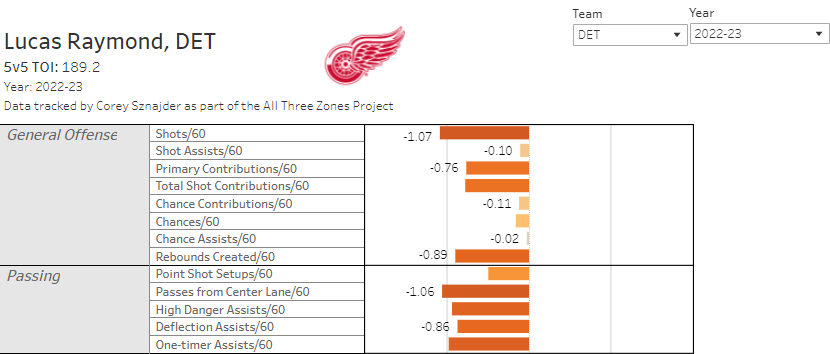
Some of those measures are worse than his rookie season, too.
I've written on these issues before so there's no sense in feeding a fed horse. Raymond still has a lot of offensive upside but he's still being carried by his line mates rather than do any of the heavy lifting, and it's not ideal. He just turned 21 years old last month so let's give him some time, but improvements in 2023-24 would be nice to see.
Last thing on Raymond: before we say his age is the problem, here are the same stats for Matty Beniers' age-20 rookie season:
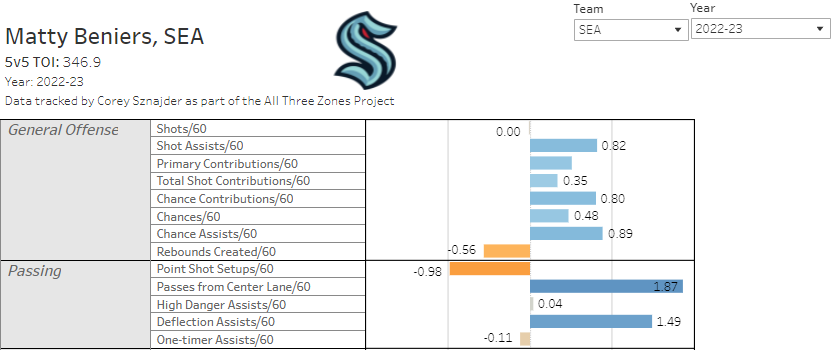
And Seth Jarvis's sophomore campaign in Carolina:
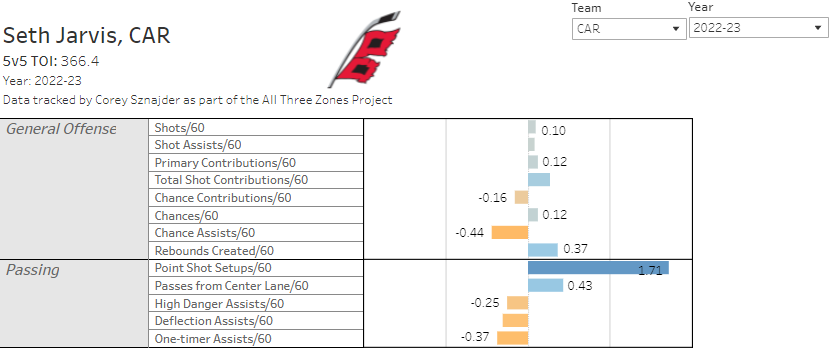
Neither are elite (yet), but both are showing some signs of playmaking/shooting ability. Those are the signs we're missing from Raymond, but he certainly has plenty of time to improve here.
Maybe it won't get the press it should, but it was an incredibly disappointing season from Andrew Copp. He finished with nine (!) goals in 82 games played, slightly out-scoring what he did in New York last year with eight goals in 18 games played. It wasn't pretty:
- Tied a career-low in goals per game.
- Career-low in goals per minute.
- Four-year low in shots per game.
- Career-low in shots per minute.
- Three-year low in points per minute.
- Three-year low in points per game.
- Career-low in hits
That is all despite a career-high in minutes (1489), surpassing last year's total by nearly 8%. Whatever hopes Red Wings fans and fantasy owners had were slowly mutilated over the course of 82 games.
And then we get to Ville Husso. Without putting too much on his shoulders – when was the last Detroit goalie that played well for a full season – Husso had a bad year. We should be reminded that heading into 2022-23, he had just 53 career starts, so assuming he'd be good in fantasy was a mistake. His .896 SV% in 56 starts does not breed confidence, and neither does Evolving Hockey having him with the third-worst Goals Saved Above Expected per 60 minutes of all regular starters this year. He tied Seattle's Martin Jones in this respect, which is not a good sign.
Improvements
The big improvement came with the man advantage, which is a good sign in an era where special team play is becoming more important with each passing season. In 2021-22, Detroit ranked 28th in goals/60 minutes at 5-on-4, rising all the way to a tied for 14th this past campaign. A big part of that was Larkin posting his best power-play impact of his career, while Tyler Bertuzzi had a high impact as well (when he was healthy). Bertuzzi is gone now, but they still have David Perron, and having a better power play was a big key in unlocking Larkin's true fantasy upside. He still hasn't gotten all the way there, but he's getting closer, and the PP getting better helps immensely.
It might not seem like it, but the team got a lot better defensively. Year over year, their expected goals against/60 minutes at 5-on-5 improved 5%. It might not sound like a lot, but the league average xGA/60 rose from 2.5 last year to 2.65 this season. That is an increase of 6%. So, Detroit improved their defence from a year ago by 5% while the league generated more expected goals, on average, by 6%. That is a huge improvement, and it's why their goals against/60 minutes was reasonable (2.82), far from the dregs like Columbus and Anaheim, despite poor goaltending. If the team keeps getting better defensively, and Husso can rebound in any meaningful way, there could be a good fantasy environment for him here.
Declines
The 5-on-5 scoring fell from 19th a year ago to 28th in 2022-23, which is not what they want to see when they're supposed to start pushing for playoffs. It wasn't bad luck, either, as the team finished 27th by expected goals for per 60 minutes. The depth just did nothing: Detroit generated 2.04 expected goals and 1.93 actual goals per 60 minutes at 5-on-5 with Perron and Larkin off the ice. Vancouver, the team we wrote about last, posted 2.25 xG and 2.13 goals/60 with Pettersson/Kuzmenko off the ice, if we want to compare to other non-playoff, non-basement teams. This is where the stunted growth from Raymond, the poor season from Copp, and the injuries to guys like Bertuzzi and Jakub Vrana really hurt. The thing is, only half those names will be in the lineup next season, so it's fair to wonder if this gets any better without a serious bottom-6 overhaul.
Honestly, that's about it. Husso was bad, but Detroit's goaltending has been bad for a while, so that's not a decline. The defence was better, the power play was better, and the penalty kill was better (though that might have just been goaltending, oddly enough). Assuming some sort of rebound from Husso, the final missing piece to this Detroit roster is true scoring depth. Copp and Raymond playing well would be a huge head start to solving that problem.
Where They Go From Here
These are the Detroit unrestricted free agents: Pius Suter, Adam Erne, Jordan Oesterle, Mark Pysyk, Robert Hägg, Magnus Hellberg, and Alex Nedeljkovic. There isn't a name there that can't be replaced with a $1M (or less) player, or AHL piece, if they're not extended. In other words, their UFAs aren't an issue.
As for the restricted free agents, there's no one overly significant. Joe Veleno will be back for cheap, and Gustav Lindstrom appears to be heading back to Europe.
That is it, and that's what makes the $30M+ in cap space that Detroit has fascinating in a sense. They have lots of futures they can part with – two first-round picks in 2023 and 2024, three second-round picks in 2023 – and that, along with the cap space, means this roster could look a lot different in September.
The crux here is that both Seider and Raymond are heading into the final year of their ELC. What they want to do with those players – bridge or long-term extension – could easily play a factor in this offseason. They might be able to afford to pay Timo Meier $10M a season or whatever, but they also have to figure out if they can sign their young players with the added contracts.
Regardless, this team isn't as far off as they seem. If Raymond/Copp can play as legitimate second-line forwards, and the team adds a legitimate top-6 scoring winger in the offseason, they are rolling into 2023-24 with two scoring lines, better team defence, and better special teams. Of course, we can't assume those guys will just get better, and it's why who they sign/trade this summer will be interesting to watch. Detroit has a wide range of outcomes next season almost regardless of who they bring in; they will go as far as Raymond/Copp/Seider bring them because there are not the same concerns for guys like Larkin, Perron, and Walman. If that first trio kicks into higher gear, and Detroit adds legitimate depth forward options, this is a dangerous team in the fall.
Previous Offseason Reviews:

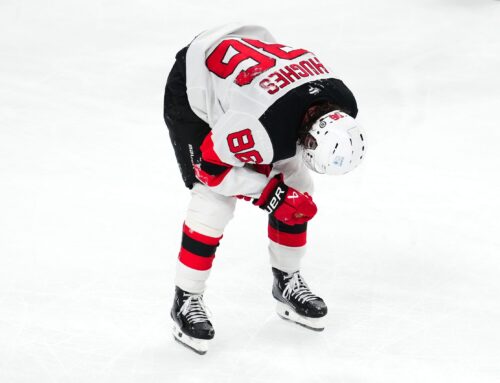
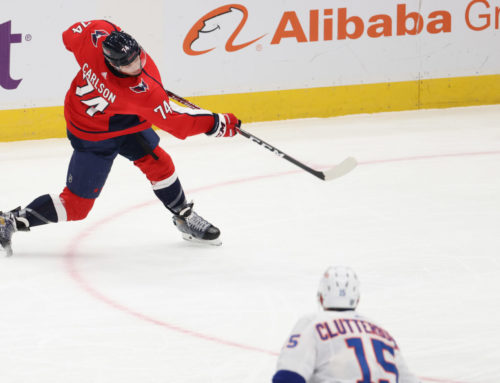
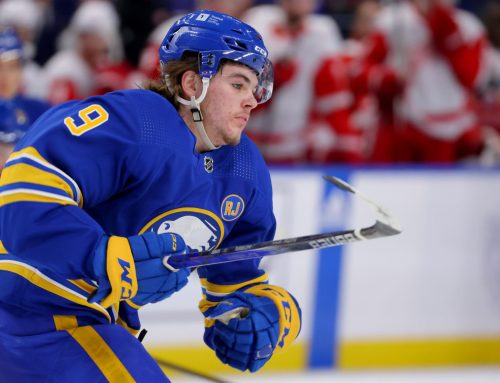
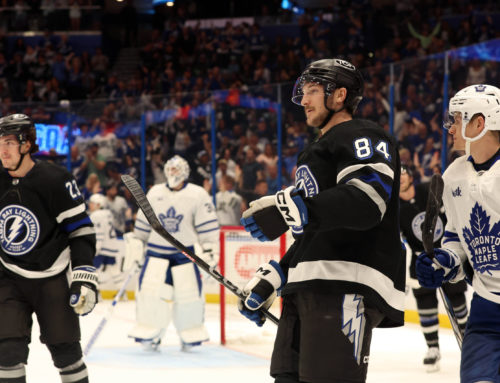
 TOR
TOR S.J
S.J ANA
ANA EDM
EDM CAR
CAR DET
DET CGY
CGY VAN
VAN BOS
BOS NSH
NSH
